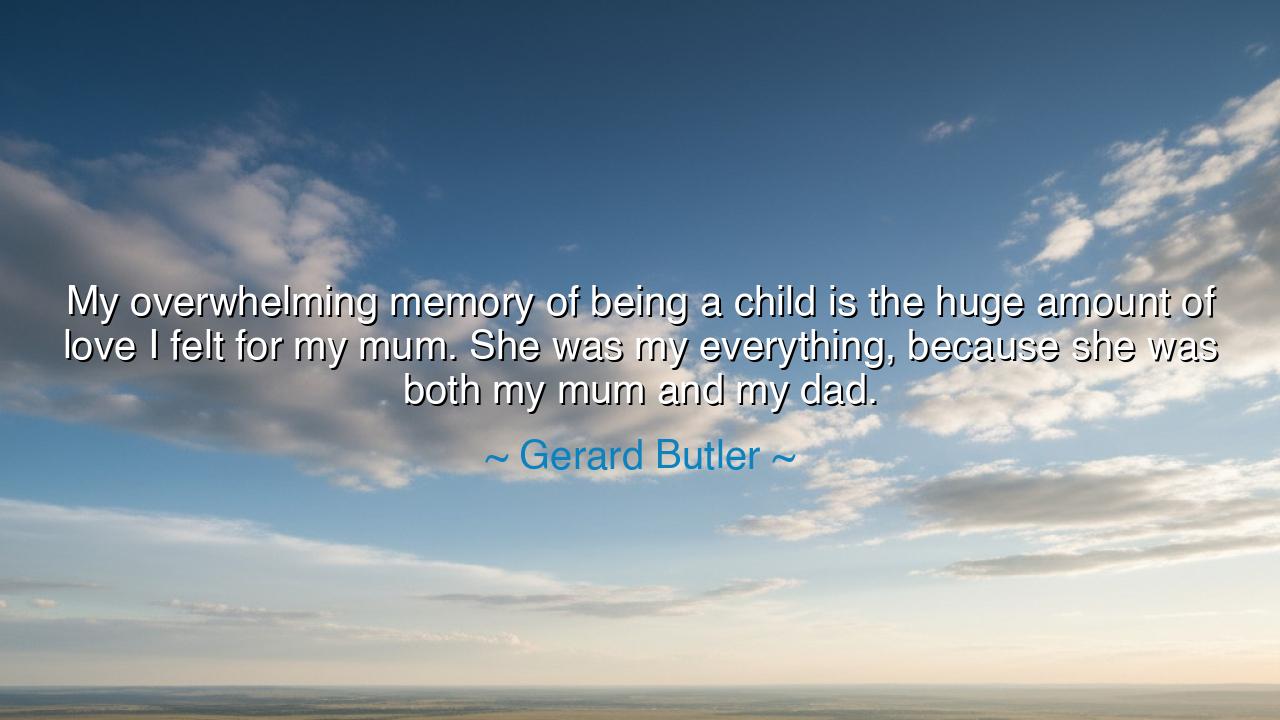
My overwhelming memory of being a child is the huge amount of
My overwhelming memory of being a child is the huge amount of love I felt for my mum. She was my everything, because she was both my mum and my dad.






In the words of Gerard Butler, “My overwhelming memory of being a child is the huge amount of love I felt for my mum. She was my everything, because she was both my mum and my dad.” These words, tender yet powerful, flow with the essence of gratitude and remembrance. They speak of love that endures, of sacrifice unseen, and of the quiet strength that rises from the heart of a parent who must become two. In this reflection, Butler does not merely recall his childhood — he honors the divine resilience of motherhood, the capacity of one soul to carry the weight of two.
The origin of this quote rests in Butler’s early life in Scotland. His parents separated when he was very young, and he was raised by his mother, Margaret, who became the pillar of his world. She bore the burden of nurturing, guiding, and protecting him alone — fulfilling both roles of father and mother, discipline and tenderness, strength and compassion. The love he remembers is not just affection; it is the all-encompassing devotion that only those who have given everything can offer. It is the love of a parent who stands as both shield and sun, who gives their child not just sustenance, but hope.
To say, “She was both my mum and my dad,” is to acknowledge a truth that transcends gender or title. It speaks to the power of presence — the courage of the one who remains when another departs. In the tapestry of life, there are many who grow up amid loss or absence, yet rise because someone chose to stay, to fight, to love beyond exhaustion. That steadfast figure — often unseen, often uncelebrated — becomes the child’s universe. Butler’s words are a tribute to all who carry such weight in silence, to every mother or father who stands alone and says, “I will be enough.”
This love recalls the story of Odysseus’s wife, Penelope, who, though her husband was lost for decades, held her family and her kingdom together. She was both ruler and nurturer, strategist and mother, strength and softness. Her son, Telemachus, grew not in the shadow of a father’s hand, but under the light of a mother’s endurance. And so too did Butler’s mother weave love and discipline into a single fabric — raising a son who would one day recognize in her the source of all he became. The ancients would have called such a parent heroic, for they knew that to hold a household together is no lesser battle than any fought with sword or shield.
There is also a lesson here about the memory of love. Butler speaks not of wealth, nor comfort, nor ease — but of the feeling that defined his childhood. What remains in him is not the struggle, but the love that surrounded him. The human spirit does not remember the scarcity of things when love is abundant; it remembers warmth, care, and laughter. The child who feels deeply loved carries a light into the world that no hardship can extinguish. This truth is as old as time: love, when given without reserve, becomes immortality.
Butler’s reflection is also a reminder of the unseen heroes among us — single parents who give everything and ask nothing in return. Their courage is quiet, but it shapes destinies. Their sacrifices are invisible, yet they echo through generations. To them, the world owes reverence, for in their daily labor they embody one of life’s highest forms of strength: love that bears the weight of two hearts. Such love does not complain, does not rest, and yet it nourishes the soul of the future.
Let this, then, be the lesson: never underestimate the power of the one who loves you completely, even in the face of hardship. Honor them not only in words, but in deeds — live in a way that justifies their faith, that rewards their sacrifice. And if life calls you to stand alone for another, to become both protector and nurturer, embrace that calling with courage. You will find that within love itself lies all the strength you need.
For in the end, Butler’s words remind us of the greatest truth of all: that love does not divide when it must stretch — it multiplies. The mother who became both parents, the guardian who became the whole world for a child — they are the quiet architects of greatness. So remember, children of the future, when you think of what shapes a life, do not look first to power, wealth, or fame. Look instead to love — enduring, selfless, and fierce — for that is the force that builds heroes, the foundation upon which every soul, like Gerard Butler’s, can stand and say, “She was my everything.”






AAdministratorAdministrator
Welcome, honored guests. Please leave a comment, we will respond soon